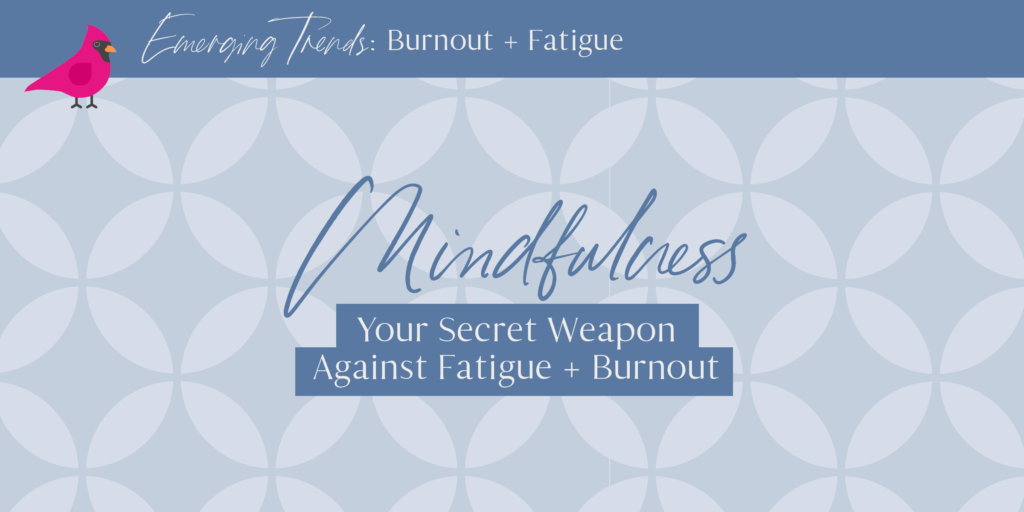
Since you’re a high achiever, you’re probably no stranger to stress. With constant deadlines, meetings, and the pressure to excel, it’s easy to feel overwhelmed and fatigued. But, what if there was something so simple and effective that can be done to help you manage these feelings and improve your overall well-being? Let’s have a chat about mindfulness!
We’ll explore what mindfulness is, how it can help you, and why it’s so effective in reducing burnout and fatigue.

Mindfulness is all about being present in the moment, without judgment. It’s the practice of intentionally focusing on your thoughts, emotions, and physical sensations as they arise, without getting swept up in them. It’s about noticing what’s happening around you and within you, with a sense of curiosity and acceptance. By doing this, you can respond to situations calmly and thoughtfully, rather than reacting impulsively.
Common mindfulness practices include:
- Meditation: Taking time to sit quietly, focusing on your breath, body sensations, or a mantra.
- Deep Breathing Exercises: Concentrating on your breath to calm your mind and body.
- Body Scan: Moving your attention through different parts of your body to notice sensations and release tension.
- Mindful Walking or Eating: Fully engaging in the experience of walking or eating, paying attention to every sensation, thought, or feeling without distraction.


You know that tight feeling in your chest when you’re stressed? That’s your body’s fight-or-flight response kicking in. Mindfulness practices can activate the body’s relaxation response, which helps counteract that stress response. By focusing on the present moment, you can break the cycle of heightened stress and anxiety.
Impact on Burnout: When you practice mindfulness regularly, you reduce overall stress levels, which are a significant contributor to burnout. Less stress means less emotional exhaustion and more energy to tackle your day.

Mindfulness encourages you to become aware of your emotions without immediately reacting to them. By observing your feelings as they come up, you can understand your triggers and responses better, allowing for more thoughtful and effective emotional regulation.
Impact on Fatigue: Better emotional regulation means you’re less likely to feel overwhelmed or drained by daily challenges. You’ll find it easier to handle stressors without letting them wear you down.

Have you ever struggled to stay focused on a task because your mind keeps wandering? Mindfulness helps train your mind to stay in the present moment, improving your concentration and reducing distractions. This can lead to increased productivity and efficiency, allowing you to accomplish tasks more effectively without overexerting yourself.
🍅 Quick Tip: Check out The Pomodoro Technique as a great way to remain mindful and make meaningful progress on focused work, 25 minutes at a time!
Impact on Burnout and Fatigue: Improved focus helps reduce that overwhelming feeling that often comes with a heavy workload. When you can concentrate better, you’re less likely to feel mentally drained by your work.

Mindfulness teaches you to treat yourself with kindness and understanding, rather than harsh criticism. This non-judgmental attitude towards yourself fosters self-compassion, which is especially helpful when you’re feeling like you’re not meeting expectations or falling short. Ask yourself, what would I do if someone said that to my bestie? If bail money would be required, then don’t say it to yourself!
Impact on Burnout: Developing self-compassion helps you recover from setbacks more quickly and reduces the negative self-talk that can contribute to burnout. By approaching challenges with a calm and balanced mindset, you build resilience and are better equipped to bounce back from stressful situations.

Mindfulness isn’t just about the mind; it’s also about the body. Practices like mindful breathing, body scans or my personal favorite – a bubble bath – can promote physical relaxation by slowing your heart rate, reducing muscle tension, and lowering blood pressure. This physical relaxation supports your overall well-being and reduces the physiological symptoms of stress.
Impact on Fatigue: Physical relaxation helps counteract fatigue by improving sleep quality and reducing physical symptoms of stress, such as headaches or muscle pain. When your body is more relaxed, you’re more likely to feel energized and engaged in your work.

Accessibility and Simplicity: One of the best things about mindfulness is that it’s easy to learn and can be practiced anywhere. You don’t need special equipment or a lot of time, which makes it perfect for fitting into any schedule or budget.
Holistic Approach: Mindfulness addresses both your mind and body, providing a comprehensive way to manage stress. By focusing on awareness, acceptance, and relaxation, mindfulness helps you develop healthier responses to the challenges you face.
Evidence-Based Benefits: Research has shown that mindfulness can reduce stress, improve mental clarity, enhance emotional regulation, and boost overall well-being. These benefits make it a powerful tool for preventing burnout and reducing fatigue.
Supportive Workplace Culture: When organizations promote mindfulness, they often create a culture of well-being and support. Encouraging mindfulness shows that your mental health is valued, which can lead to increased job satisfaction and lower turnover rates.

Mindfulness is more than just a trend—it’s a practical tool that can help you manage stress and prevent burnout. Here are some ways you can start incorporating mindfulness into your work life:
- Participate in or Offer Mindfulness Training: If your organization offers workshops, courses, or apps that teach mindfulness techniques, take advantage of them.
- Shout Out: I absolutely adore the YouTube channel Therapy in a Nutshell by licensed marriage and family therapist, Emma McAdam! Just go to YouTube and search “Therapy in a Nutshell Mindfulness” a several videos will appear.
- Shout Out: I absolutely adore the YouTube channel Therapy in a Nutshell by licensed marriage and family therapist, Emma McAdam! Just go to YouTube and search “Therapy in a Nutshell Mindfulness” a several videos will appear.
- Encourage Regular Practice: Start your day with a few minutes of mindful breathing or take short breaks for meditation during your workday.
- Create Mindful Spaces: Find a quiet spot in your workplace where you can practice mindfulness or take a break from your desk.
- Integrate Mindfulness into Your Routine: Make mindfulness a part of your daily routine, whether it’s through mindful eating (as in, not while at your desk replying to emails), walking, or simply taking a moment to breathe.
Mindfulness and mental health practices are powerful tools for combating work-related burnout and fatigue. By promoting awareness, reducing stress, and enhancing emotional resilience, mindfulness helps you manage the challenges of a demanding work environment more effectively. As interest in mindfulness grows, more organizations are recognizing its value in creating a healthier, more supportive workplace culture. Start small, be consistent, and watch how mindfulness can transform your work life.
Are you ready to give mindfulness a try? Share your thoughts and experiences in the comments below!
✨ Boldly go,


Leave a Reply